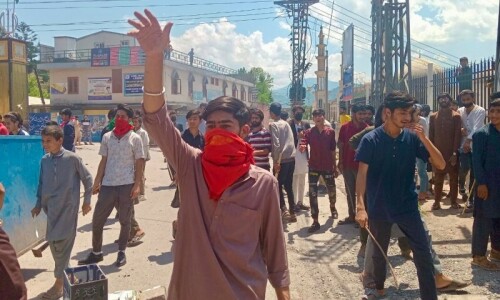ISLAMABAD: The government has quietly reversed its decision of setting up military courts in Azad Jammu and Kashmir (AJK) and Gilgit-Baltistan (GB).
“We were today informed that the government has no intention of extending 21st Amendment in the Constitution to AJK and GB,” said Chairman of National Assembly’s Special Committee on Kashmir Maulana Fazlur Rehman on Friday after chairing an in-camera session of the committee.
Also read: Asma questions rationale of military courts in Gilgit-Baltistan
The Kashmir committee was briefed by Adviser to Prime Minister on National Security and Foreign Affairs Sartaj Aziz and Federal Minister for Kashmir Affairs and Gilgit-Baltistan Birjees Tahir.
The meeting had been convened to discuss escalation in tensions with India along the Line of Control and Working Boundary and preparations for Kashmir Day observance on Feb 5.
“Media reports about the planned move to establish military courts in AJK and GB had created concerns,” said Mr Rehman who initially agreed to support military courts in the country at the All Parties Conference, but later reneged on his decision.
The Prime Minister’s Office announced on Jan 13that Prime Minister Nawaz Sharif, while chairing a meeting on the implementation status of National Action Plan for fighting terrorism and extremism, had “approved that Gilgit-Baltistan and AJK Councils would also adopt the 21st Amendment in the Constitution as well as amendment in the Army Act to facilitate formation of military courts in those areas”.
Mr Rehman did not say why the government changed its mind. It is, however, believed that it could possibly be due to the special constitutional status of the two regions.
The parliament in the first week of January adopted the 21st Amendment Bill and the Pakistan Army (Amendment) Bill, 2015 unanimously to set up constitutionally protected military courts for two years for trying civilian terrorism suspects.
The establishment of military courts is facing legal challenges, while the bureaucracy has been slow to operationalise the special tribunals.
The military had earlier announced setting up of nine courts in the first phase.
NAP REVIEW: The government, meanwhile, on Friday put out the second update on the steps it had taken to implement the 20-point National Action Plan (NAP) on counter-terrorism.
Coming against the backdrop of a fresh sectarian attack in Shikarpur on Friday that killed over 50 worshippers, the update which listed thousands of combing operations — arrest of suspects, action against use of loudspeakers and hate material, verification of mobile phone SIMs, registration of Afghan refugees — looked more of statistical jugglery to convince the people that the government was alive to its responsibilities.
The government has not yet disclosed information about militant groups that have been targeted in these operations and which terrorists have been nabbed.
According to a statement issued by the Prime Minister’s Office, 9,074 combing operations have been conducted in Punjab, 1,178 in Sindh, 2,326 in Khyber Pakhtunkhwa (KP), 30 in Balochistan, 322 in Islamabad Capital Territory (ICT), 503 in AJK, 16 in GB and 47 in Fata.
The statistics attempt to create an impression that Punjab government was the best performer in the drive against extremism and terrorism.
Meanwhile, 2,950 cases of loudspeaker violation were registered in Punjab, five in Sindh, 97 in KP, 59 in Islamabad, 45 in AJK and one in GB. On this violation 1,806 persons have been arrested in Punjab, 97 in KP and 55 in Islamabad. Equipment was confiscated from 1,085 places in Punjab, 108 in KP, six in AJK and one in GB.
The statement said 455 cases of hate material were registered in Punjab, 23 in KP, four in Balochistan, 46 in AJK and one in GB. It said 348 people were arrested on these charges in Punjab, 10 in KP, eight in Balochistan and eight in GB. Hate materials have been confiscated from 24 places in KP and 41 shops selling hate material have been sealed in Punjab.
The statement said 7,000 Afghan refugees were registered in Punjab, 327,788 in Balochistan and 29 in GB.
A total of 16.3 million mobile phone SIMs had been verified across the country, it added.
Published in Dawn January 31st, 2015
On a mobile phone? Get the Dawn Mobile App: Apple Store | Google Play











































